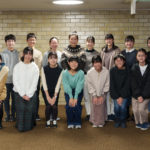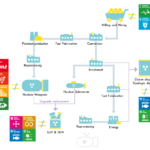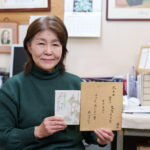Challenges of Inheriting and Conveying A-bomb Experience:What to Inherit and Pass On 1)
Noriyuki Kawano
Professor, Director of Hiroshima University, Institute for Peace Science
Luli van der DOES
Visiting Research Scholar (JSPS International Research Fellow)
Hiroshima University, Institute for Peace Science
In Japanese, the word 継承 (keisho, inheritance) means inheriting something from someone and conveying it. In recent decades, the necessity of inheriting and conveying the a-bomb experience has been keenly recognized and its importance has been pointed out. However, there has been no direct discussion on what exactly can be inherited and what to inherit. There are two reasons for this: firstly, the complexity of the radiation illness caused by a-bomb 2), and secondly the misconception that the a-bomb experience is confined only to that first hellish day below the mushroom cloud. Of course, the tragedies which occurred on “those days”, August 6 and 9, 1945, are the center of the a-bomb experiences and memories. However, the illnesses caused by a-bombs should be considered in a multifaceted manner, not only linked to the scourge of “those days”, it should also encompass the after-effects of the atomic bombings, the psychological effects and the damage, such as health concerns, caused by the after-effects. As has been pointed out, these illnesses are related to all aspects of human life, that is, health, social and economic life. If so, what part of the a-bomb experiences do the next generation, who did not experience the a-bombs, inherit from a-bomb survivors and what part will they pass on to younger generations? In addition, how do we inherit the wishes and hopes of a-bomb survivors calling for a world without nuclear weapons, which is said to be inseparable from a-bomb survivor movements. Which aspects of the
a-bomb experiences can be passed on and which aspects cannot be? Have those experiences which cannot be passed on simply fallen into oblivion? Even if it is difficult to inherit, is there no way to resist oblivion? These essential questions are the starting points of and basis for this paper.
In this paper, firstly, after explaining when the discussion on the importance of inheriting the a-bomb experiences started administratively, I will explain how the a-bomb survivors themselves, who are responsible for passing on their experiences, think about this inheritance. Secondly, I will reconsider the a-bomb illnesses which form part of the a-bomb experience. Finally, I will consider what the next generations will take from the a-bomb experiences and what should be inherited. Along with this, I will discuss what kind of initiatives should be taken. In this paper, I will introduce several initiatives taken by the government and universities, and will also propose suggestions on the possibility of inheriting the a-bomb experiences.
1) This paper has been extensively revised based on reports presented at two international symposiums.
1 Noriyuki Kawano, What can be inherited? What will we pass on? reported at an international symposium, The Atomic Bombs and War Memories: Heritage of Peace in an Uncertain Age (host: the Institute for Peace Science Hiroshima University) at Senda Campus, Hiroshima University.
2Noriyuki Kawano, What is A-bomb Experience? What is Hiroshima? : From the Perspective of Peace Tourism presented at an international symposium, Possibility of Peace Research Tourism (host: Center for Media and Tourism Studies, Research Faculty of Media and Communication Hokkaido University), conducted at Hokkaido University on December 11, 2017.
2) Going forward, I will use “illnesses caused by a-bombs). However, considering that one of the characteristics of a-bomb illnesses is the delayed damage caused by exposure to radiation, illnesses caused by the atomic bombing should be referred as a-bomb illnesses caused by radiation exposure.








